Investor Sentiment and Government Policy Changes: An Analysis
VerifiedAdded on 2023/03/29
|6
|1054
|315
Essay
AI Summary
This essay analyzes the impact of government policies on the stock market and investor sentiment. It examines the effects of financial policies, currency inflation, interest rates, tariffs, and subsidies on stock returns. The essay also evaluates investor sentiment in certain and uncertain economic sit...
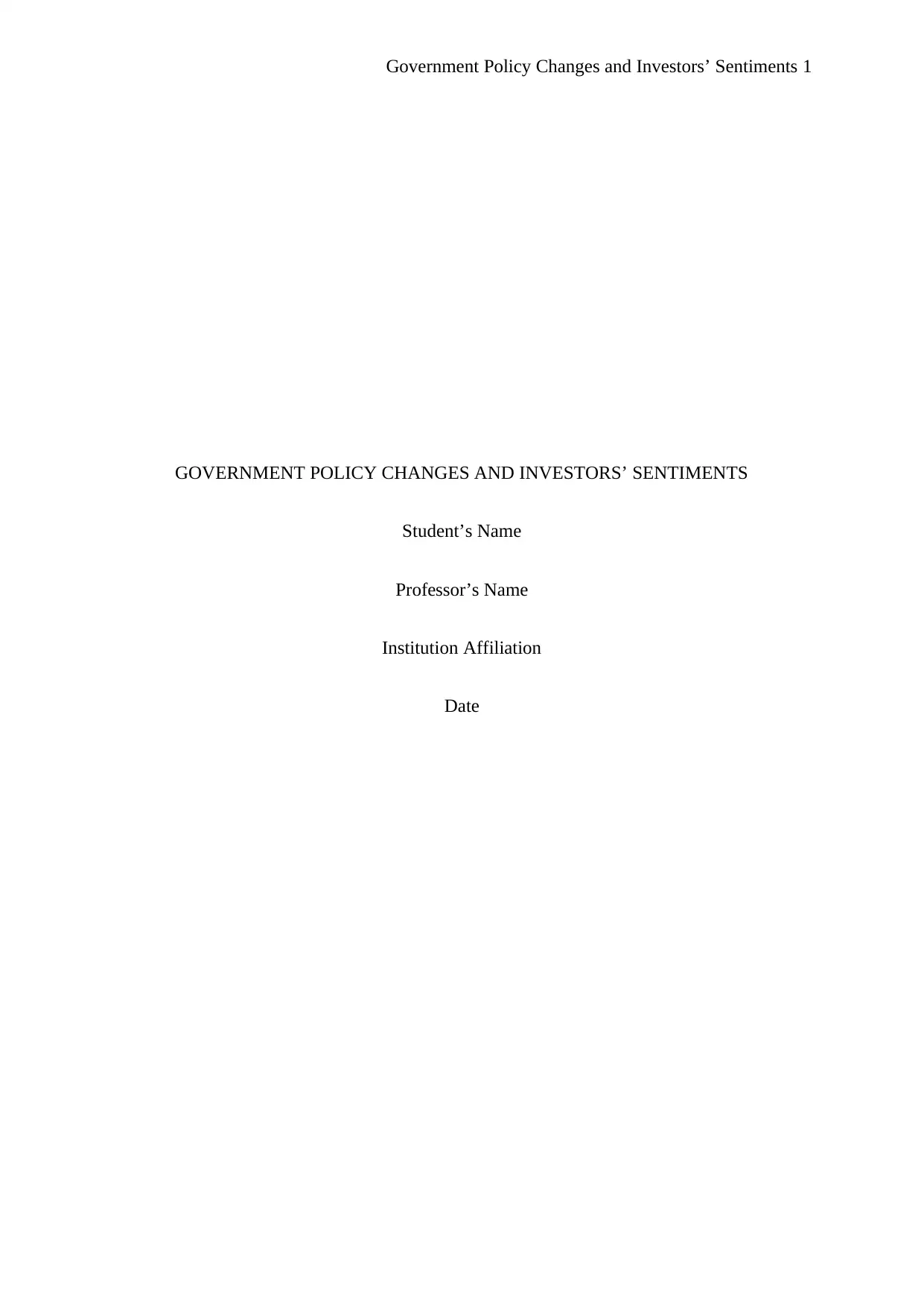
Government Policy Changes and Investors’ Sentiments 1
GOVERNMENT POLICY CHANGES AND INVESTORS’ SENTIMENTS
Student’s Name
Professor’s Name
Institution Affiliation
Date
GOVERNMENT POLICY CHANGES AND INVESTORS’ SENTIMENTS
Student’s Name
Professor’s Name
Institution Affiliation
Date
Paraphrase This Document
Need a fresh take? Get an instant paraphrase of this document with our AI Paraphraser
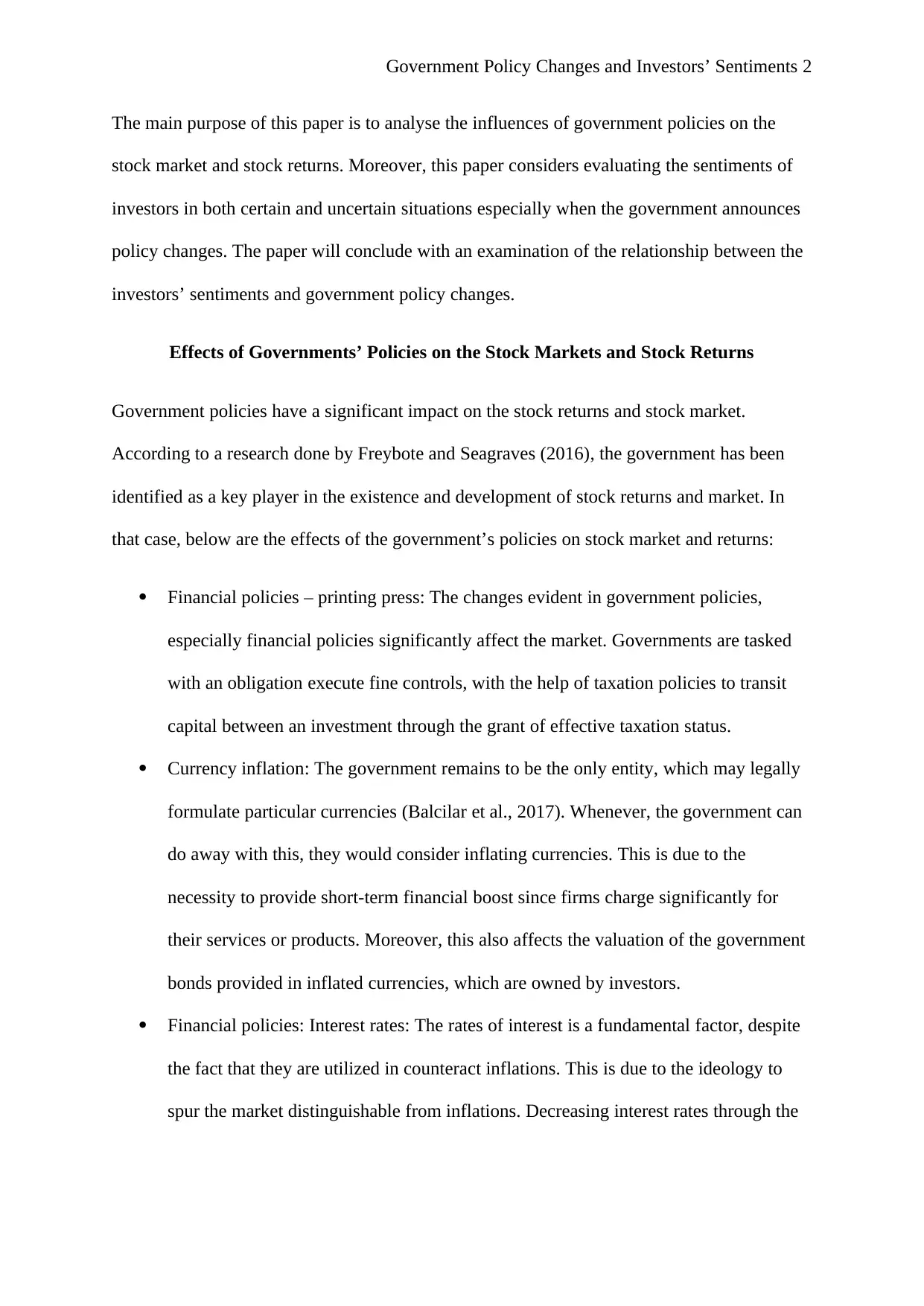
Government Policy Changes and Investors’ Sentiments 2
The main purpose of this paper is to analyse the influences of government policies on the
stock market and stock returns. Moreover, this paper considers evaluating the sentiments of
investors in both certain and uncertain situations especially when the government announces
policy changes. The paper will conclude with an examination of the relationship between the
investors’ sentiments and government policy changes.
Effects of Governments’ Policies on the Stock Markets and Stock Returns
Government policies have a significant impact on the stock returns and stock market.
According to a research done by Freybote and Seagraves (2016), the government has been
identified as a key player in the existence and development of stock returns and market. In
that case, below are the effects of the government’s policies on stock market and returns:
Financial policies – printing press: The changes evident in government policies,
especially financial policies significantly affect the market. Governments are tasked
with an obligation execute fine controls, with the help of taxation policies to transit
capital between an investment through the grant of effective taxation status.
Currency inflation: The government remains to be the only entity, which may legally
formulate particular currencies (Balcilar et al., 2017). Whenever, the government can
do away with this, they would consider inflating currencies. This is due to the
necessity to provide short-term financial boost since firms charge significantly for
their services or products. Moreover, this also affects the valuation of the government
bonds provided in inflated currencies, which are owned by investors.
Financial policies: Interest rates: The rates of interest is a fundamental factor, despite
the fact that they are utilized in counteract inflations. This is due to the ideology to
spur the market distinguishable from inflations. Decreasing interest rates through the
The main purpose of this paper is to analyse the influences of government policies on the
stock market and stock returns. Moreover, this paper considers evaluating the sentiments of
investors in both certain and uncertain situations especially when the government announces
policy changes. The paper will conclude with an examination of the relationship between the
investors’ sentiments and government policy changes.
Effects of Governments’ Policies on the Stock Markets and Stock Returns
Government policies have a significant impact on the stock returns and stock market.
According to a research done by Freybote and Seagraves (2016), the government has been
identified as a key player in the existence and development of stock returns and market. In
that case, below are the effects of the government’s policies on stock market and returns:
Financial policies – printing press: The changes evident in government policies,
especially financial policies significantly affect the market. Governments are tasked
with an obligation execute fine controls, with the help of taxation policies to transit
capital between an investment through the grant of effective taxation status.
Currency inflation: The government remains to be the only entity, which may legally
formulate particular currencies (Balcilar et al., 2017). Whenever, the government can
do away with this, they would consider inflating currencies. This is due to the
necessity to provide short-term financial boost since firms charge significantly for
their services or products. Moreover, this also affects the valuation of the government
bonds provided in inflated currencies, which are owned by investors.
Financial policies: Interest rates: The rates of interest is a fundamental factor, despite
the fact that they are utilized in counteract inflations. This is due to the ideology to
spur the market distinguishable from inflations. Decreasing interest rates through the
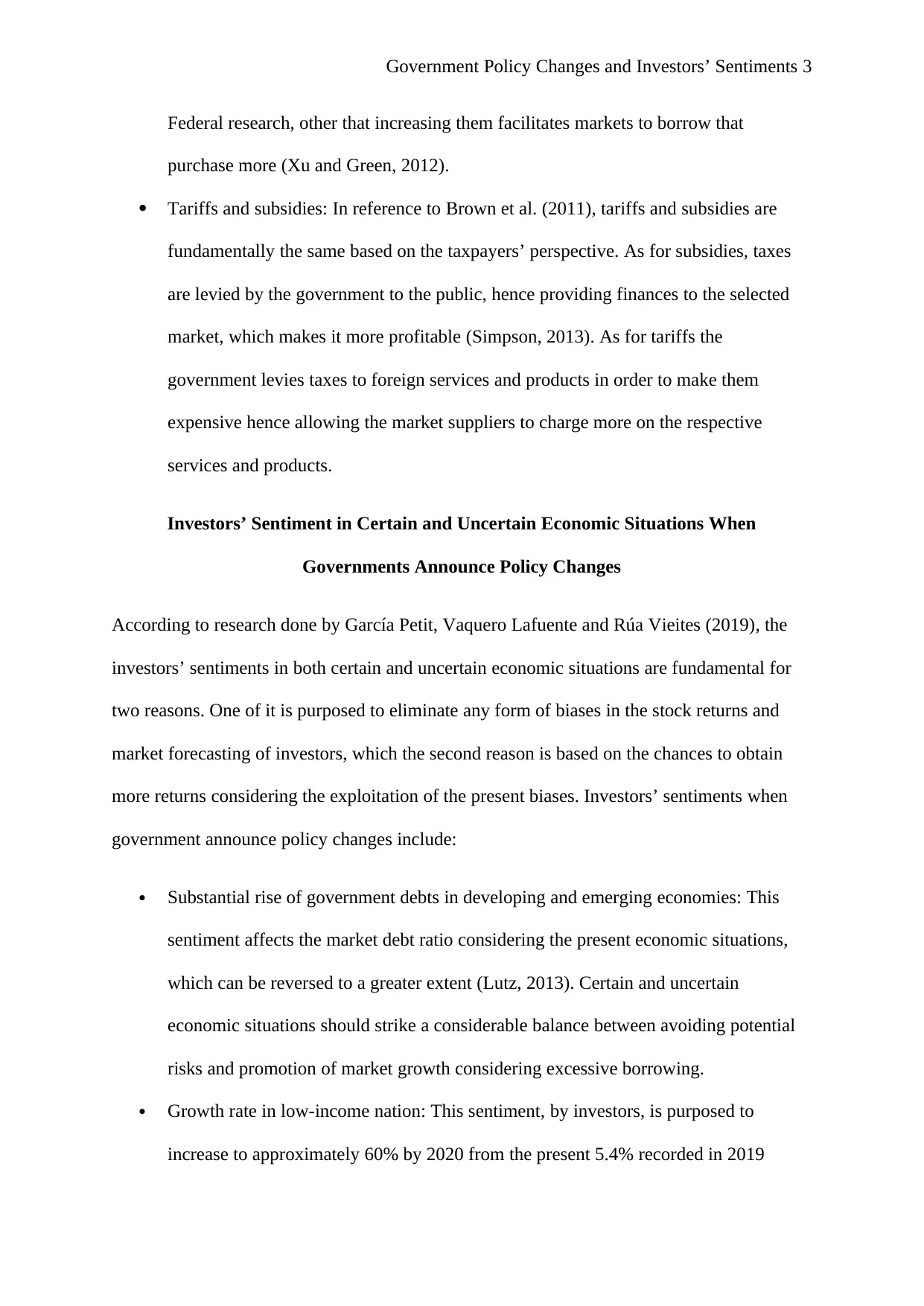
Government Policy Changes and Investors’ Sentiments 3
Federal research, other that increasing them facilitates markets to borrow that
purchase more (Xu and Green, 2012).
Tariffs and subsidies: In reference to Brown et al. (2011), tariffs and subsidies are
fundamentally the same based on the taxpayers’ perspective. As for subsidies, taxes
are levied by the government to the public, hence providing finances to the selected
market, which makes it more profitable (Simpson, 2013). As for tariffs the
government levies taxes to foreign services and products in order to make them
expensive hence allowing the market suppliers to charge more on the respective
services and products.
Investors’ Sentiment in Certain and Uncertain Economic Situations When
Governments Announce Policy Changes
According to research done by García Petit, Vaquero Lafuente and Rúa Vieites (2019), the
investors’ sentiments in both certain and uncertain economic situations are fundamental for
two reasons. One of it is purposed to eliminate any form of biases in the stock returns and
market forecasting of investors, which the second reason is based on the chances to obtain
more returns considering the exploitation of the present biases. Investors’ sentiments when
government announce policy changes include:
Substantial rise of government debts in developing and emerging economies: This
sentiment affects the market debt ratio considering the present economic situations,
which can be reversed to a greater extent (Lutz, 2013). Certain and uncertain
economic situations should strike a considerable balance between avoiding potential
risks and promotion of market growth considering excessive borrowing.
Growth rate in low-income nation: This sentiment, by investors, is purposed to
increase to approximately 60% by 2020 from the present 5.4% recorded in 2019
Federal research, other that increasing them facilitates markets to borrow that
purchase more (Xu and Green, 2012).
Tariffs and subsidies: In reference to Brown et al. (2011), tariffs and subsidies are
fundamentally the same based on the taxpayers’ perspective. As for subsidies, taxes
are levied by the government to the public, hence providing finances to the selected
market, which makes it more profitable (Simpson, 2013). As for tariffs the
government levies taxes to foreign services and products in order to make them
expensive hence allowing the market suppliers to charge more on the respective
services and products.
Investors’ Sentiment in Certain and Uncertain Economic Situations When
Governments Announce Policy Changes
According to research done by García Petit, Vaquero Lafuente and Rúa Vieites (2019), the
investors’ sentiments in both certain and uncertain economic situations are fundamental for
two reasons. One of it is purposed to eliminate any form of biases in the stock returns and
market forecasting of investors, which the second reason is based on the chances to obtain
more returns considering the exploitation of the present biases. Investors’ sentiments when
government announce policy changes include:
Substantial rise of government debts in developing and emerging economies: This
sentiment affects the market debt ratio considering the present economic situations,
which can be reversed to a greater extent (Lutz, 2013). Certain and uncertain
economic situations should strike a considerable balance between avoiding potential
risks and promotion of market growth considering excessive borrowing.
Growth rate in low-income nation: This sentiment, by investors, is purposed to
increase to approximately 60% by 2020 from the present 5.4% recorded in 2019
⊘ This is a preview!⊘
Do you want full access?
Subscribe today to unlock all pages.

Trusted by 1+ million students worldwide
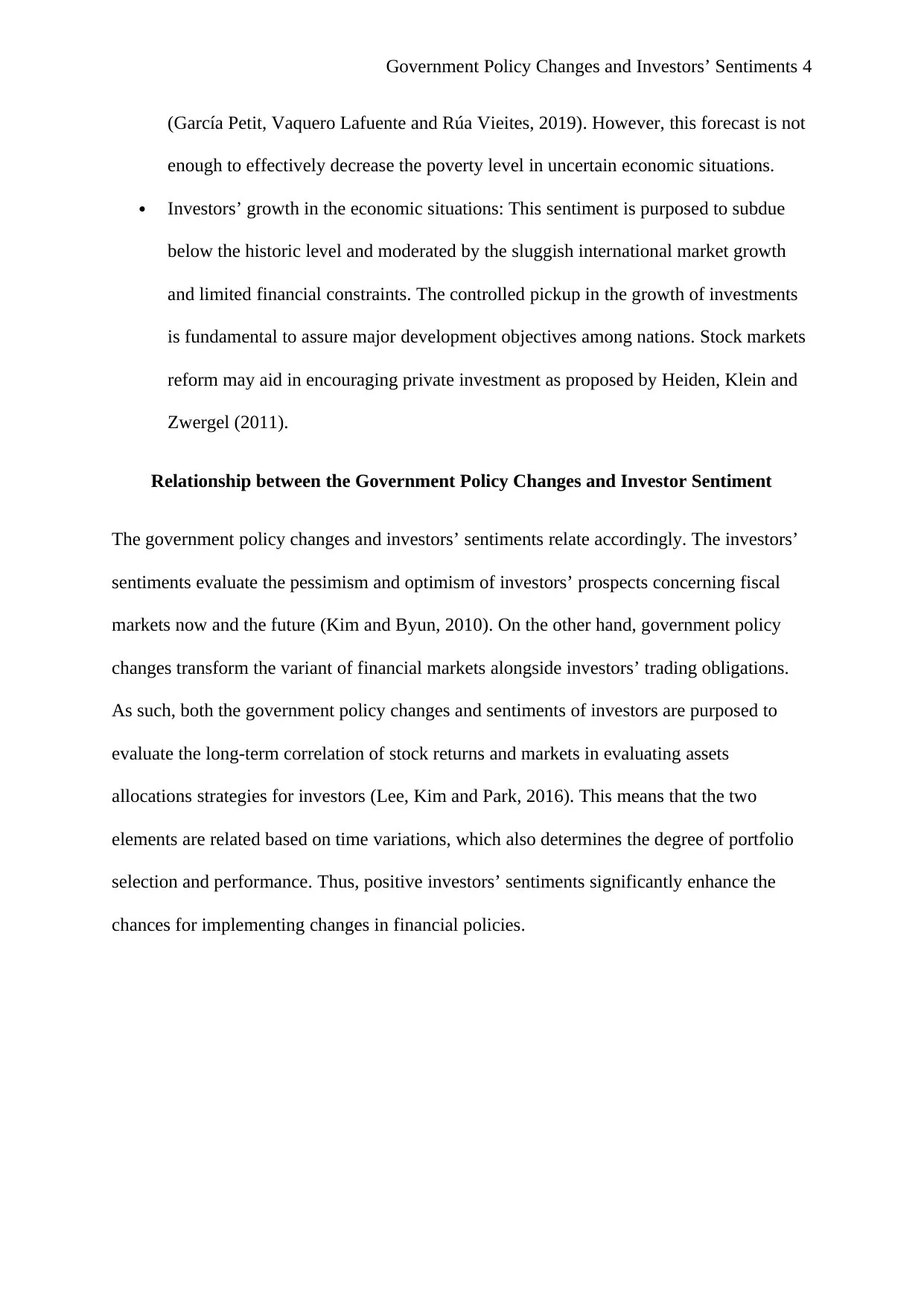
Government Policy Changes and Investors’ Sentiments 4
(García Petit, Vaquero Lafuente and Rúa Vieites, 2019). However, this forecast is not
enough to effectively decrease the poverty level in uncertain economic situations.
Investors’ growth in the economic situations: This sentiment is purposed to subdue
below the historic level and moderated by the sluggish international market growth
and limited financial constraints. The controlled pickup in the growth of investments
is fundamental to assure major development objectives among nations. Stock markets
reform may aid in encouraging private investment as proposed by Heiden, Klein and
Zwergel (2011).
Relationship between the Government Policy Changes and Investor Sentiment
The government policy changes and investors’ sentiments relate accordingly. The investors’
sentiments evaluate the pessimism and optimism of investors’ prospects concerning fiscal
markets now and the future (Kim and Byun, 2010). On the other hand, government policy
changes transform the variant of financial markets alongside investors’ trading obligations.
As such, both the government policy changes and sentiments of investors are purposed to
evaluate the long-term correlation of stock returns and markets in evaluating assets
allocations strategies for investors (Lee, Kim and Park, 2016). This means that the two
elements are related based on time variations, which also determines the degree of portfolio
selection and performance. Thus, positive investors’ sentiments significantly enhance the
chances for implementing changes in financial policies.
(García Petit, Vaquero Lafuente and Rúa Vieites, 2019). However, this forecast is not
enough to effectively decrease the poverty level in uncertain economic situations.
Investors’ growth in the economic situations: This sentiment is purposed to subdue
below the historic level and moderated by the sluggish international market growth
and limited financial constraints. The controlled pickup in the growth of investments
is fundamental to assure major development objectives among nations. Stock markets
reform may aid in encouraging private investment as proposed by Heiden, Klein and
Zwergel (2011).
Relationship between the Government Policy Changes and Investor Sentiment
The government policy changes and investors’ sentiments relate accordingly. The investors’
sentiments evaluate the pessimism and optimism of investors’ prospects concerning fiscal
markets now and the future (Kim and Byun, 2010). On the other hand, government policy
changes transform the variant of financial markets alongside investors’ trading obligations.
As such, both the government policy changes and sentiments of investors are purposed to
evaluate the long-term correlation of stock returns and markets in evaluating assets
allocations strategies for investors (Lee, Kim and Park, 2016). This means that the two
elements are related based on time variations, which also determines the degree of portfolio
selection and performance. Thus, positive investors’ sentiments significantly enhance the
chances for implementing changes in financial policies.
Paraphrase This Document
Need a fresh take? Get an instant paraphrase of this document with our AI Paraphraser
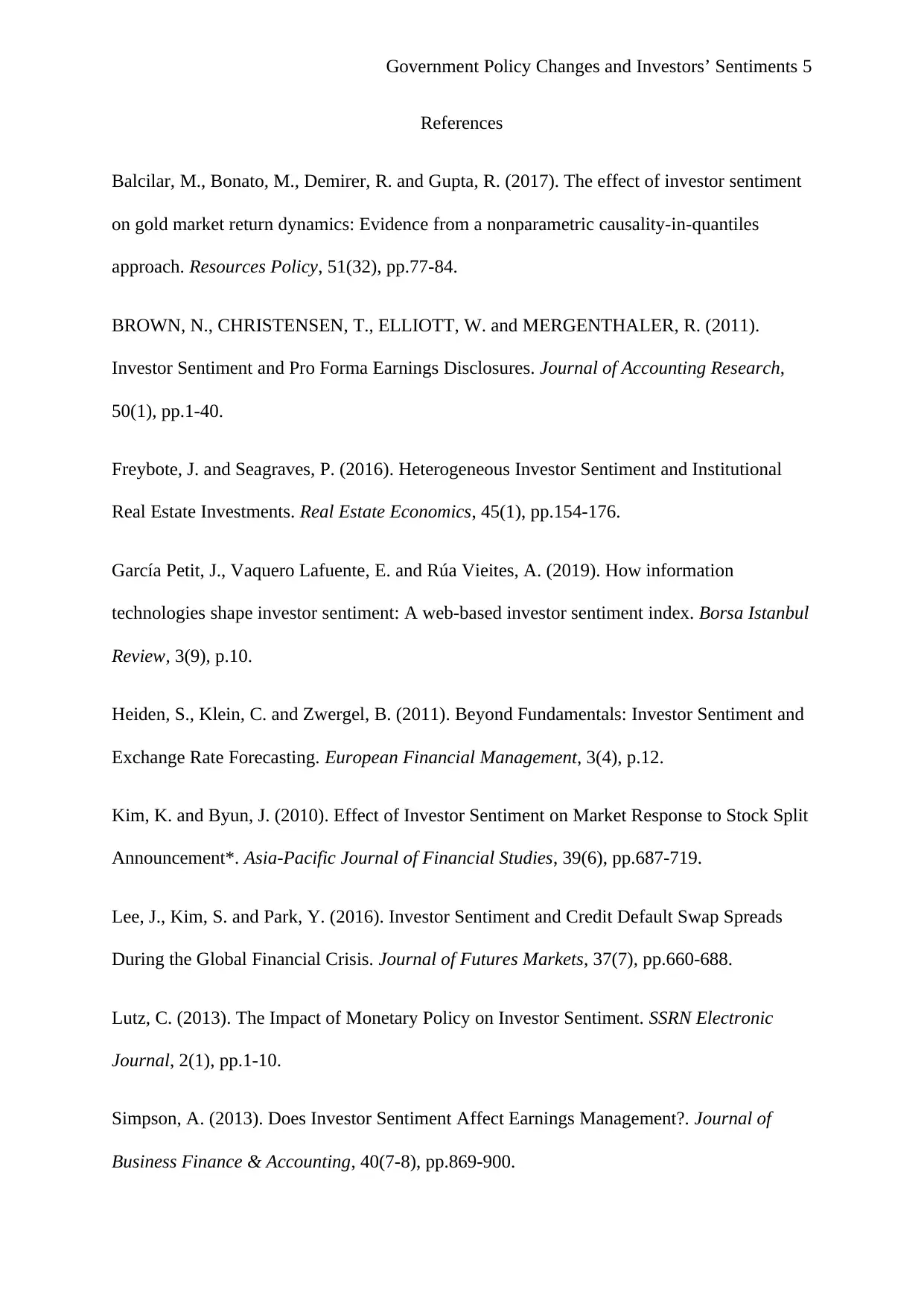
Government Policy Changes and Investors’ Sentiments 5
References
Balcilar, M., Bonato, M., Demirer, R. and Gupta, R. (2017). The effect of investor sentiment
on gold market return dynamics: Evidence from a nonparametric causality-in-quantiles
approach. Resources Policy, 51(32), pp.77-84.
BROWN, N., CHRISTENSEN, T., ELLIOTT, W. and MERGENTHALER, R. (2011).
Investor Sentiment and Pro Forma Earnings Disclosures. Journal of Accounting Research,
50(1), pp.1-40.
Freybote, J. and Seagraves, P. (2016). Heterogeneous Investor Sentiment and Institutional
Real Estate Investments. Real Estate Economics, 45(1), pp.154-176.
García Petit, J., Vaquero Lafuente, E. and Rúa Vieites, A. (2019). How information
technologies shape investor sentiment: A web-based investor sentiment index. Borsa Istanbul
Review, 3(9), p.10.
Heiden, S., Klein, C. and Zwergel, B. (2011). Beyond Fundamentals: Investor Sentiment and
Exchange Rate Forecasting. European Financial Management, 3(4), p.12.
Kim, K. and Byun, J. (2010). Effect of Investor Sentiment on Market Response to Stock Split
Announcement*. Asia-Pacific Journal of Financial Studies, 39(6), pp.687-719.
Lee, J., Kim, S. and Park, Y. (2016). Investor Sentiment and Credit Default Swap Spreads
During the Global Financial Crisis. Journal of Futures Markets, 37(7), pp.660-688.
Lutz, C. (2013). The Impact of Monetary Policy on Investor Sentiment. SSRN Electronic
Journal, 2(1), pp.1-10.
Simpson, A. (2013). Does Investor Sentiment Affect Earnings Management?. Journal of
Business Finance & Accounting, 40(7-8), pp.869-900.
References
Balcilar, M., Bonato, M., Demirer, R. and Gupta, R. (2017). The effect of investor sentiment
on gold market return dynamics: Evidence from a nonparametric causality-in-quantiles
approach. Resources Policy, 51(32), pp.77-84.
BROWN, N., CHRISTENSEN, T., ELLIOTT, W. and MERGENTHALER, R. (2011).
Investor Sentiment and Pro Forma Earnings Disclosures. Journal of Accounting Research,
50(1), pp.1-40.
Freybote, J. and Seagraves, P. (2016). Heterogeneous Investor Sentiment and Institutional
Real Estate Investments. Real Estate Economics, 45(1), pp.154-176.
García Petit, J., Vaquero Lafuente, E. and Rúa Vieites, A. (2019). How information
technologies shape investor sentiment: A web-based investor sentiment index. Borsa Istanbul
Review, 3(9), p.10.
Heiden, S., Klein, C. and Zwergel, B. (2011). Beyond Fundamentals: Investor Sentiment and
Exchange Rate Forecasting. European Financial Management, 3(4), p.12.
Kim, K. and Byun, J. (2010). Effect of Investor Sentiment on Market Response to Stock Split
Announcement*. Asia-Pacific Journal of Financial Studies, 39(6), pp.687-719.
Lee, J., Kim, S. and Park, Y. (2016). Investor Sentiment and Credit Default Swap Spreads
During the Global Financial Crisis. Journal of Futures Markets, 37(7), pp.660-688.
Lutz, C. (2013). The Impact of Monetary Policy on Investor Sentiment. SSRN Electronic
Journal, 2(1), pp.1-10.
Simpson, A. (2013). Does Investor Sentiment Affect Earnings Management?. Journal of
Business Finance & Accounting, 40(7-8), pp.869-900.
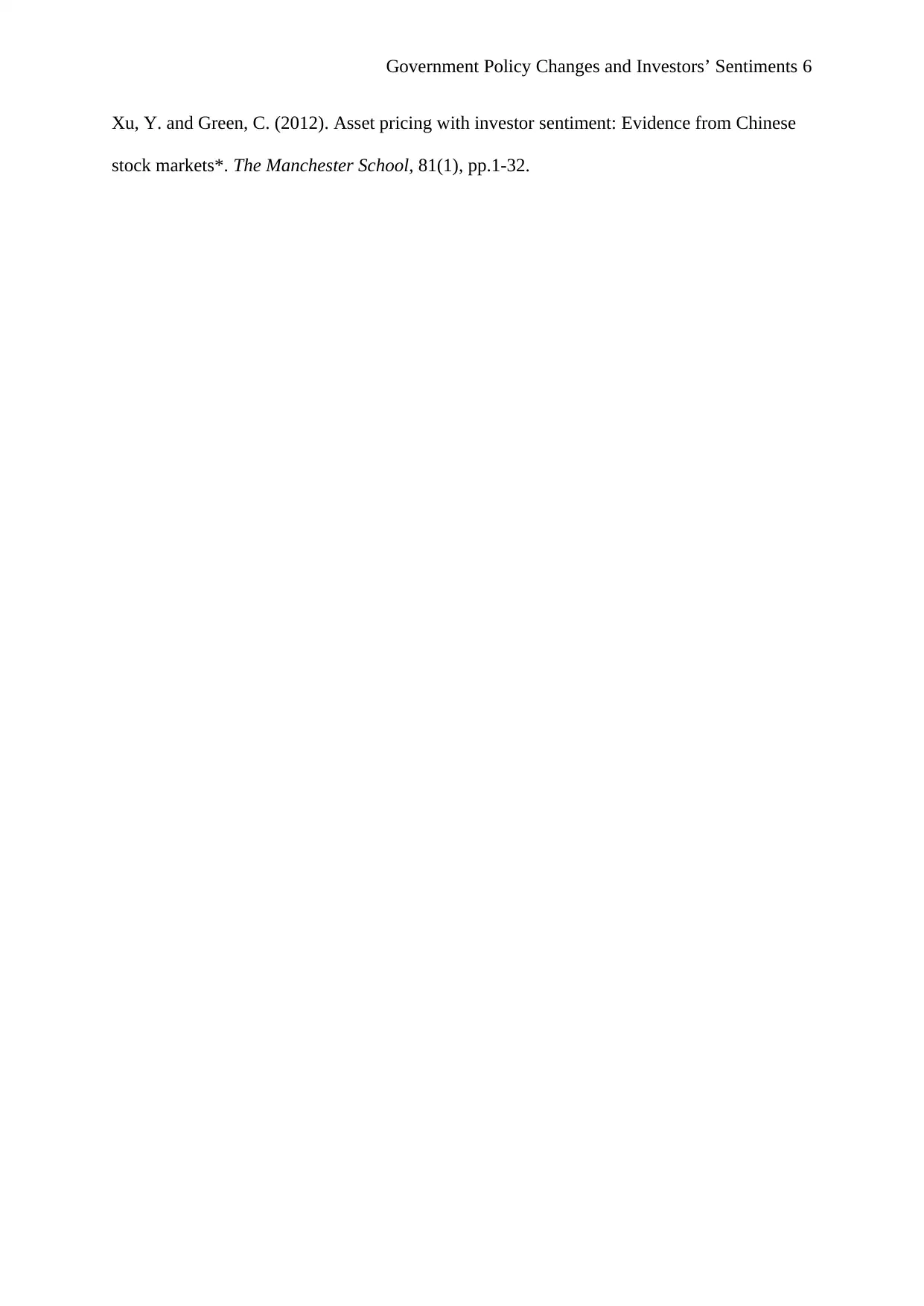
Government Policy Changes and Investors’ Sentiments 6
Xu, Y. and Green, C. (2012). Asset pricing with investor sentiment: Evidence from Chinese
stock markets*. The Manchester School, 81(1), pp.1-32.
Xu, Y. and Green, C. (2012). Asset pricing with investor sentiment: Evidence from Chinese
stock markets*. The Manchester School, 81(1), pp.1-32.
⊘ This is a preview!⊘
Do you want full access?
Subscribe today to unlock all pages.

Trusted by 1+ million students worldwide
1 out of 6
Related Documents
Your All-in-One AI-Powered Toolkit for Academic Success.
+13062052269
info@desklib.com
Available 24*7 on WhatsApp / Email
![[object Object]](/_next/static/media/star-bottom.7253800d.svg)
Unlock your academic potential
© 2024 | Zucol Services PVT LTD | All rights reserved.




